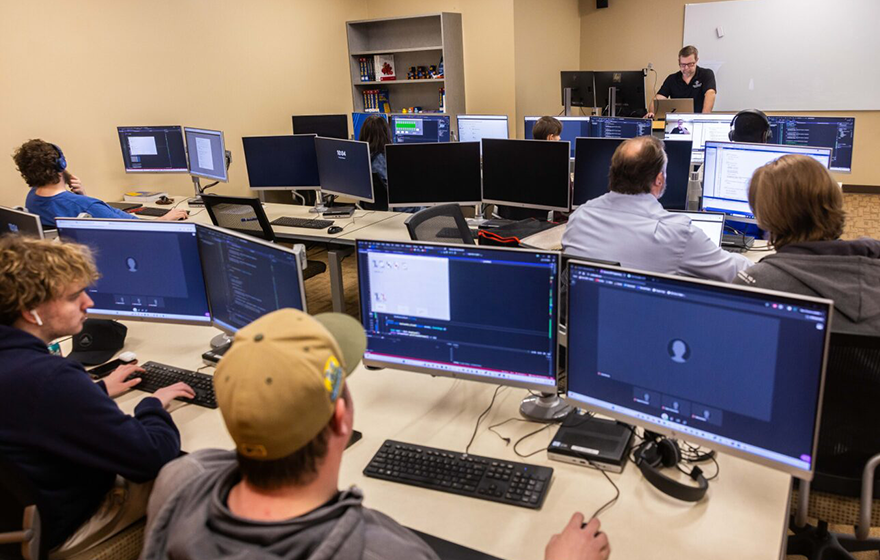Maximize Your Resources with Specialist Software Engineering Staffing Solutions
Wiki Article
Committed Developers vs. In-House Teams: Which Is Right for You?
The decision between making use of specialized programmers and keeping an in-house group is a considerable one that can affect the trajectory of your projects and total organization method. On the other hand, internal teams add to a cohesive business society and a nuanced understanding of long-term objectives.Comprehending Dedicated Developers
The growing demand for specialized skills in the tech market has led to the development of devoted developers as a viable option for lots of companies. These specialists are commonly contracted on a task basis, permitting business to leverage particular experience without the long-term commitment connected with permanent hires. Devoted programmers are usually ingrained within a customer's group, giving adaptability and scalability to meet task needs.This version permits companies to access an international skill swimming pool, which is specifically helpful in a rapidly developing technical landscape. Dedicated developers can be sourced from different geographical locations, guaranteeing that companies can find the ideal ability at affordable prices. They commonly bring a wide range of experience and understanding, having dealt with diverse projects across various industries.
Moreover, committed developers can focus solely on the jobs at hand, boosting performance and efficiency. They are furnished to integrate perfectly right into existing process, teaming up carefully with in-house teams to accomplish task purposes. This approach not just minimizes the worry of employment and training yet additionally permits organizations to remain dexterous, adapting swiftly to transforming market demands and technological developments.
Advantages of In-House Teams

In addition, in-house teams tend to have a much deeper understanding of the firm's objective, worths, and objectives. This alignment can improve staff member interaction and inspiration, as staff member feel a lot more attached to their work and the organization's success. Additionally, having a committed in-house group enables better positioning of techniques and objectives, as these participants are constantly focused on the business's priorities.
In-house teams additionally assist in quicker decision-making processes, as they can react more swiftly to modifications and obstacles. The well-known relationships and familiarity with company methods permit for streamlined workflows and decreased miscommunication. Eventually, the combination of a cohesive society, positioning with business objectives, and reliable communication makes in-house groups an important possession for numerous companies, specifically those aiming to cultivate lasting development and advancement.
Expense Considerations
When examining expense considerations, both in-house groups and devoted designers existing unique top article financial effects for organizations. Involving committed developers typically involves a pay-per-project or per hour price design, which can be affordable for organizations with changing project needs. This technique permits flexibility in scaling sources up or down, making certain that companies just pay for the services they need.In comparison, in-house teams involve fixed costs, including wages, benefits, and overhead expenditures such as office and tools. While this model provides higher control and prompt accessibility of resources, it may lead to greater long-term expenditures, specifically if the workload does not justify a permanent staff.
Moreover, business need to consider the surprise expenses associated with recruitment and training of in-house workers, which can even more stress spending plans. Sometimes, the moment and sources spent on managing an internal team can diminish the organization's core company goals.

Job Administration and Adaptability
Task monitoring and adaptability are critical aspects that affect the option in between internal teams and dedicated designers. Dedicated groups commonly have established processes for handling tasks efficiently, leveraging certain techniques like Agile or Scrum, which facilitate repetitive development and adaptability.
Eventually, the selection in between devoted programmers and internal teams depends upon the wanted level of versatility and the details job management needs. Business should assess their functional dynamics, task complexity, and resource accessibility to determine which option lines up finest with their strategic purposes.
Making the Right Choice
Picking the right development approach-- internal teams or specialized developers-- needs a cautious evaluation of different aspects that line up with a business's critical objectives. Alternatively, internal teams can supply better continuity and integration with existing employees.Following, review your budget plan. Devoted programmers commonly offer a cost-efficient service for short-term projects, while in-house teams may sustain higher long-lasting costs due to wages, benefits, and expenses costs. Analyze the degree of control and collaboration preferred; internal teams usually cultivate more powerful interaction and positioning with company culture.
In addition, consider the moment structure. If immediate results are necessary, devoted programmers can be onboarded rapidly, whereas building an in-house group takes time for employment and training. Weigh the long-lasting vision of your organization. Spending in an in-house team might generate better returns over time if continual development is important. Ultimately, the choice depends upon a complete analysis of these variables, making sure placement with your firm's operational needs and general objectives.
Verdict
In final thought, the decision in between devoted programmers and internal teams hinges on job requirements and business objectives. Alternatively, in-house teams cultivate a cohesive Full Article culture and much deeper alignment with long-term objectives.The choice between making use of dedicated developers and preserving an internal group is a significant one that can impact the trajectory of your jobs and overall company method.Task management and flexibility are crucial variables that affect the selection between devoted designers and internal groups. dedicated development team.In contrast, in-house teams may succeed in keeping a regular job administration structure due to their experience with the company's society and lasting goals. Committed developers commonly present an economical remedy for temporary jobs, while in-house groups may incur higher long-lasting expenses due to wages, benefits, and overhead costs.In conclusion, the decision between in-house groups and devoted developers hinges on task requirements and business purposes
Report this wiki page